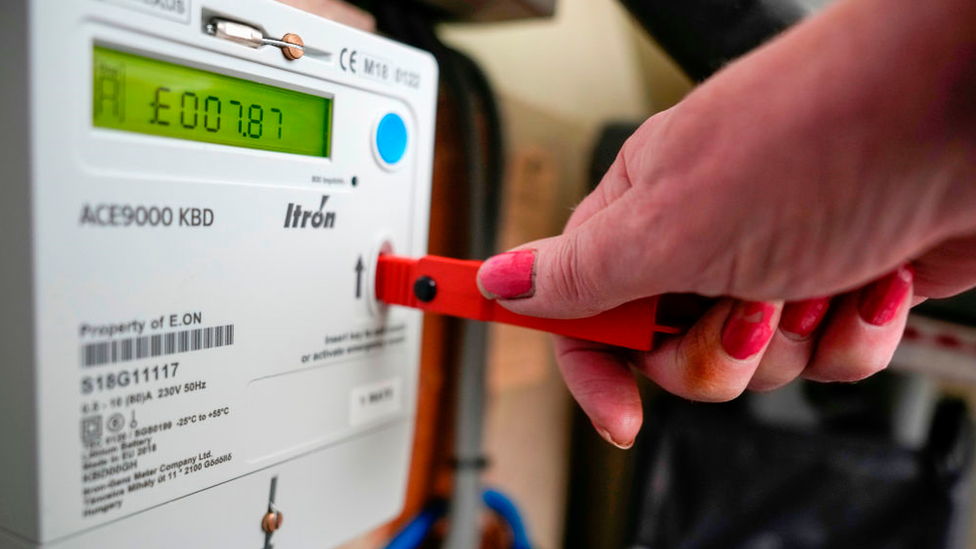Payout numbers for force-fit energy meters unacceptable, says energy secretary
- Published

The number of compensation payouts made to people wrongly put onto prepayment meters is "completely unacceptable", the energy secretary has said.
Just 1,500 out of 150,000 people assessed have had financial redress from energy suppliers who forced-fitted the meters into their homes.
Claire Coutinho said she had spoken to the regulator to sort compensation payouts "as soon as possible".
But energy suppliers only believe about 2,500 people require compensation.
Energy regulator Ofgem confirmed that about 150,000 cases had been "reviewed" so far by suppliers themselves, who have decided that just over 2,500 customers were entitled to payouts.
Some 1,502 customers have been paid initial compensation payments totalling £342,450 between them, with suppliers setting aside a further £200,000 for another 1,000.
Ofgem told all energy suppliers to review cases of people who were forced onto prepayment meters between the start of 2022 and the end of January 2023 to assess whether they required compensation.
However, the regulator told the BBC that British Gas, the supplier found to be hiring agents who forced their way into the homes of vulnerable people to fit prepayment meters, against Ofgem rules, was not included in the compensation figures released so far.
It said the supplier was not included in its review and was subject to a separate, ongoing investigation.
The exposure of the practice in which vulnerable people had their homes broken into for meters to be fitted led to a public outcry.
Asked on Sunday with Laura Kuenssberg if the government was "abandoning" thousands of people due to the small number of compensation payouts to date, Ms Coutinho replied: "No, absolutely not."
She said the situation was "completely unacceptable", adding she had spoken to Ofgem, who are overseeing compensation, to "make sure that people can get the compensation as quickly as possible".
"We're getting new figures in the coming months but we are ready to act to make sure that people can get that money," she added.
Ofgem told the BBC it was working with suppliers to "make sure they identify all eligible consumers and pay appropriate levels of compensation promptly".
It said it expected to update the number of cases where redress has been paid to customers by the end of June.
The amounts paid to individual customers so far from each supplier varies, Ofgem said, adding that companies had compensated customers in different ways, including sending cheques, adding credit to the accounts, and writing off debt.
Energy UK, the body which represents energy suppliers, told the BBC that companies had "identified a small proportion of cases where the correct process wasn't followed and where the customers affected are being compensated as a result".
It said with energy debt at "record levels", prepayment meters had an "important role to play in preventing customers falling further into arrears".
It said new rules mean there "stronger safeguards" in place governing forced meter installations, which it said "will only take place after repeated attempts to contact the customer and a visit to the property to confirm suitability".
"The Code of Practice also identifies those categories of vulnerable customers who will be exempt from any prepayment meter installation," a spokesperson added.
Prepayment meters require customers to pay for their energy use in advance, either through accounts or by adding credit to a card in a convenience store or Post Office.
About four million households have such meters in the UK. There are three types - key meters, smart card meters and smart prepayment meters. The first two work in a very similar way.
They are most common in rented properties and having one is a more expensive method of paying for energy than by direct debit, but is sometimes the only option for people who have struggled to pay and are in debt to an energy supplier.
For years, energy companies were able to force-fit prepayment meters into homes when bills went unpaid. This can be done remotely on a smart meter, or physically after a firm has been given a warrant to do so.
The practice was halted when British Gas was exposed last year, but various suppliers have recently been given permission to resume the forced fitting of prepayment meters under stricter rules.
Strict rules also apply that prevent energy suppliers moving an at-risk customer onto a prepayment meter if they are struggling to pay.

What can I do if I can't afford my energy bill?
Check your direct debit: Your monthly payment is based on your estimated energy use for the year. Your supplier can reduce your bill if your actual use is less than the estimation
Pay what you can: If you can't meet your direct debit or quarterly payments, ask your supplier for an "able to pay plan" based on what you can afford
Claim what you are entitled to: Check you are claiming all the benefits you can. The independent MoneyHelper, external website has a useful guide


Do you think you're owed compensation after having an energy meter force-fitted? Share your story by emailing haveyoursay@bbc.co.uk, external.
Please include a contact number if you are willing to speak to a BBC journalist. You can also get in touch in the following ways:
WhatsApp: +44 7756 165803
Tweet: @BBC_HaveYourSay, external
Please read our terms & conditions and privacy policy
If you are reading this page and can't see the form you will need to visit the mobile version of the BBC website to submit your question or comment or you can email us at HaveYourSay@bbc.co.uk, external. Please include your name, age and location with any submission.
Related topics
- Published3 April 2024
